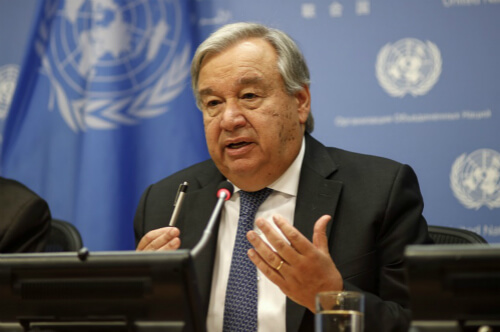
Message by United Nations Secretary-General António Guterres on COVID-19 and People on the Move文章源自英文巴士-https://www.en84.com/9311.html
联合国秘书长安东尼奥·古特雷斯关于新冠疫情与流动人口问题的讲话文章源自英文巴士-https://www.en84.com/9311.html
文章源自英文巴士-https://www.en84.com/9311.html
3 June 2020文章源自英文巴士-https://www.en84.com/9311.html
2020年6月3日文章源自英文巴士-https://www.en84.com/9311.html
文章源自英文巴士-https://www.en84.com/9311.html
COVID-19 continues to devastate lives and livelihoods around the globe – hitting the most vulnerable the hardest.文章源自英文巴士-https://www.en84.com/9311.html
文章源自英文巴士-https://www.en84.com/9311.html
2019冠状病毒病仍在摧毁全球各地人们的生活和生计——对最弱势群体的冲击最大。文章源自英文巴士-https://www.en84.com/9311.html
文章源自英文巴士-https://www.en84.com/9311.html
This is particularly true for millions of people on the move – such as refugees and internally displaced persons who are forced to flee their homes from violence or disaster, or migrants in precarious situations. Now, they face three crises rolled into one.
对于数以百万计的流动人口——例如被迫逃离家园躲避暴力或灾难的难民和境内流离失所者,或处于岌岌可危局势中的移民而言,尤其如此。而现在,他们所面临的是三重危机。
First, a health crisis – as they become exposed to the virus, often in crowded conditions where social distancing is an impossible luxury – and where basics such as health care, water, sanitation and nutrition are often hard to find. This impact will be even more devastating to the large number of people on the move who live in least developed countries. One-third of the world’s internally displaced population live in the 10 countries most at-risk to COVID-19.
首先,健康危机——因为他们暴露于接触病毒的风险之中,而且往往是在拥挤的状况下,在这样的环境里,社交距离成为一种不可能的奢求——而且往往很难获得医疗保健、水、环境卫生和营养等基本生活条件。
Second, people on the move face a socio-economic crisis – especially those working in the informal economy without access to social protection.
其次,流动人口面临着一场社会经济危机——尤其是那些就业于非正规经济而无法获得社会保障的人。
In addition, the loss of income from COVID-19 is likely to lead to a colossal $109 billion drop in remittances. That’s the equivalent of nearly three-quarters of all official development assistance that is no longer being sent back home to the 800 million people who depend on it.
此外,2019冠状病毒病造成的收入损失可能会导致汇款巨幅减少,减少额可达1090亿美元。这相当于所有官方发展援助的近四分之三,而8亿人赖以生存的这一汇款现在不再汇回了。
Third, people on the move face a protection crisis. More than 150 countries have imposed border restrictions to contain the spread of the virus. At least 99 states make no exception for people seeking asylum from persecution.
第三,流动人口面临着一场保护危机。150多个国家为遏制病毒的传播实施了边境限制,其中至少99个国家对为免受迫害而寻求庇护的人不予例外。
At the same time, fear of COVID-19 has led to skyrocketing xenophobia, racism and stigmatization. And the already precarious situation of women and girls is ever more dire, as they face higher risks of exposure to gender-based violence, abuse and exploitation.
与此同时,对2019冠状病毒病的恐惧导致仇外、种族主义和污名化激增。妇女和女童本已岌岌可危的处境更加严峻,因为她们面临着更大的性别暴力、虐待和剥削的风险。
Yet even as refugees and migrants face all these challenges, they are contributing heroically on the frontlines in essential work. About one in eight of all nurses globally, for example, is practicing in a country different from where they were born.
然而,虽然难民和移民面临着所有这些挑战,但他们仍在不可或缺的工作的前线做出可歌可泣的贡献。例如,全球约八分之一的护士正在非出生地国执业。
The COVID-19 crisis is an opportunity to reimagine human mobility. Four core understandings must guide the way:
2019冠状病毒病危机是一个重新想象人类流动性的契机。必须以四点核心认识指引方向:
First, exclusion is costly, and inclusion pays. An inclusive public health and socio-economic response will help suppress the virus, restart our economies and advance the Sustainable Development Goals.
首先,排斥的代价是巨大的,而包容必有回报。包容性的公共卫生和社会经济应对措施将有助于遏制病毒,重启我们的经济,推进可持续发展目标。
Second, we must uphold human dignity in the face of the pandemic and learn from the handful of countries that have shown how to implement travel restrictions and border controls while fully respecting human rights and international refugee protection principles.
第二,我们必须在这一大流行病面前维护人的尊严,并向若干国家学习如何在充分尊重人权和国际难民保护原则的同时实施旅行限制和边境管制。
Third, no-one is safe until everyone is safe. Diagnostics, treatment and vaccines must be accessible to all.
第三,除非人人安全,否则无人安全。所有人都必须能够获得诊断、治疗和疫苗。
Fourth and finally, people on the move are part of the solution. Let us remove unwarranted barriers, explore models to regularize pathways for migrants and reduce transaction costs for remittances.
第四,也是最后一点,流动人口是解决方案的一部分。让我们消除不必要的障碍,探索移民途径常规化的模式,并降低汇款交易成本。
I am grateful to countries, especially developing countries, that have opened their borders and hearts to refugees and migrants, despite their own social, economic, and now health, challenges.
我感谢那些虽自身面临社会挑战、经济挑战及现在新添的健康挑战,但仍向难民和移民敞开边界和心怀的国家,特别是发展中国家。
They offer a moving lesson to others in a period when doors are closed. It is essential that these countries are provided increased support and full solidarity.
在人人闭门自保之时,这些国家给别的国家上了一堂感人的课。必须给予这些国家更多的支持和充分团结,这一点至关重要。
We all have a vested interest to ensure that the responsibility of protecting the world’s refugees is equitably shared and that human mobility remains safe, inclusive, and respects international human rights and refugee law.
我们要确保公平分担保护全世界难民的责任,确保人员流动始终安全且具有包容性并尊重国际人权和难民法,这符合我们每个人的既得利益。
No country can fight the pandemic or manage migration alone. But together, we can contain the spread of the virus, buffer its impact on the most vulnerable and recover better for the benefit of all.
任何国家都不能单独抗击这一疫情或管理好移民问题。但是,只要我们同舟共济,就能遏制病毒的传播,缓冲其对最弱势群体的影响,并更好地恢复,造福于所有的人。
Thank you.
谢谢。

